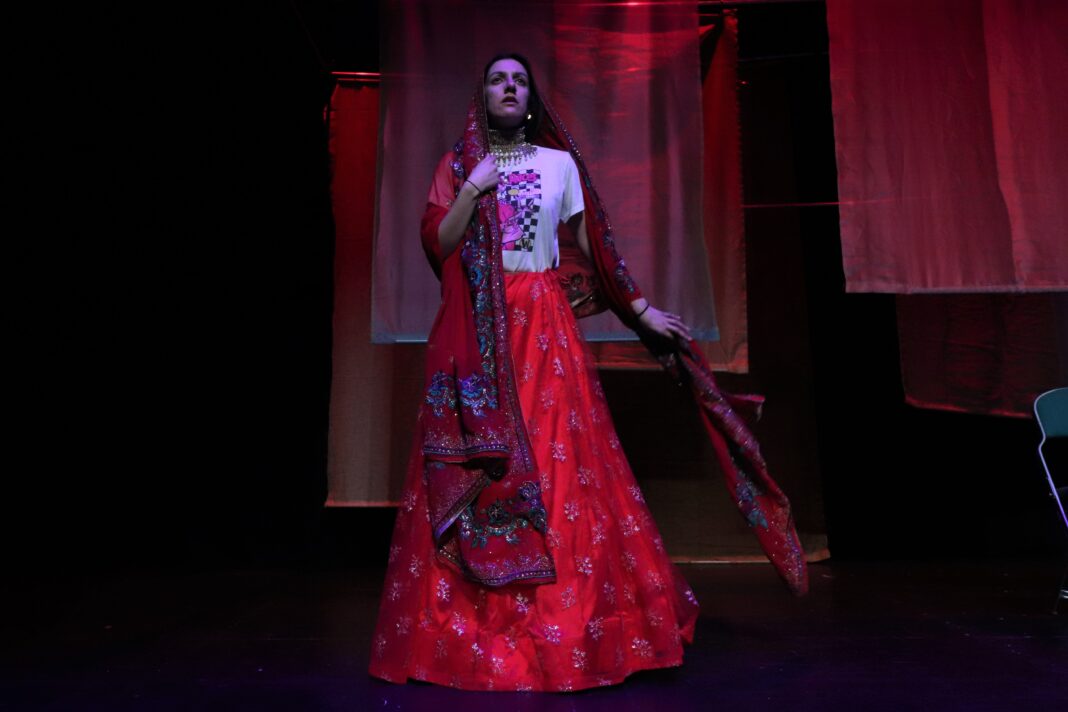Click here to read Noor’s full interview with Saher.
If you’re looking for a truly captivating theatre experience in Manchester, then look no further than Vitamin D. This play is an absolute must-see, and I highly recommend it to anyone looking for a thought-provoking and engaging performance.
The talented cast delivers gripping performances that are brimming with energy and emotion. The play was a joy from the first scene; joy, in the sense, being utterly relatable. Every moment of the play is filled with tension and excitement, and you’ll find yourself on the edge of your seat, eager to see what happens next.
The story is of a girl, or a larki (also named ‘Larki’ in the play), who returns back to her parents’ home after the end of her divorce. Everyone in town and their mothers have their assumptions, from Larki being a victim of physical abuse to Larki being the ‘feisty, and feminist’ woman who will not compromise – we have heard these assumptions and are accustomed to all of these opinions.
The power of music and traditional attire
Right from the opening scene, Vitamin D draws you in with its stunning visuals and nostalgic music, a captivating blend of Qawwali and Bhangra. The audience is greeted with a warm and cozy theatre, and welcomed to an array of different coloured dupattas draped and flowing when each character introduces herself; organza, silk, chiffon. But the dupatta at centre stage is a vibrant red with intricate green and gold crystals traditionally worn by South Asian dulhans (brides).
“The influence of music comes from my parents,” Saher Shah, writer and main character of Vitamin D tells me. “I learned about good music from a young age because it would be blaring in our house on a Sunday morning. You know, my sister and my brother taught me about 80s music like I learned about Queen and US rap. My mom sings and plays the dholki so it’s been in me forever. And I only let this side out about four years ago.”
Complexities of the desi mother/daughter relationship
We learn about those who are closest around Larki with their best intentions, sometimes causing hurt without realizing. Such as the lovable and sweet Mama, who only wants the best for Larki – sometimes “the best” translating to searching high and low for the perfect rishta-match (proposals) before they are all gone because happiness can only be attained through “apnay ghar ki ban gayee” (loosely meaning ‘the daughter has officially gone to her own marital home’).
The mother/daughter relationship can be one of a strained nature. The love of our desi mothers truly is unconditional, as they always strive for nothing but the best for their children. We gain insight from both the mother and daughter’s perspectives, and how they are pulling or pushing against each other.
Coercive control and mental health
The theatre production introduces the judgmental aunty, who we all know, coming to give her sympathies to Mama and sharing what the solution is to “fix this”. This ‘fixing’ and ‘finding a solution’ is the essence and backbone of our desi mothers. The image that we need to protect of a functioning and happy family is what we fall trap to, upholding so-called honour and absorbing abuse – we take this badge of honour and wear this proud abuse and absorb the failures of the people around us.
We hear Larki learn a new term: coercive control; a term coined by Evan Stark to help understand domestic abuse to be more than a “fight”. It is a pattern of behaviour which seeks to take away the victim’s liberty or freedom, to strip away their sense of self. It is not just women’s bodily integrity which is violated but also their human rights. This term was also introduced into Section 76 of the Serious Crime Act 2015.
We learn about Larki’s misfortune from the worries of the forbidden Evil Eye. We are introduced to the friend who funnily but seriously says “I totes forgot to say “masha’Allah” three times on your wedding day, I think I only said it twice! It’s my fault you are divorced.” This satirical comedy of Larki’s new life is, what we learn, lacking in our society – we all need vitamin D. In this sense, it is a vital vitamin to represent freedom when we choose ourselves.
What I loved most about Vitamin D is its powerful message about the importance of mental health. This play tackles some tough topics with sensitivity and honesty, and it really resonated with me. But despite the serious subject matter, there are plenty of moments of levity and humour throughout the play, making it a well-rounded and enjoyable experience.
The significance and message behind the title
“The title ‘Vitamin D’ is a play on the word ‘divorce’ but also how we see divorce,” Saher explains. “It’s seen to be a bad thing in the South Asian community and a failure, usually on the woman’s part mostly. But the community do not want to see the failure of a marriage. The community don’t need more of it.
“Whereas vitamins are something that we do need more of, or we don’t know what we’re deficient in. Usually, we don’t know. We’ll go to the doctor. We do a blood test and the doctor says ‘by the way the reason you’re not feeling well is because you’re deficient in something so you need to replenish that’. And then once you have it, it nourishes you, makes you feel good.
“So, what if we saw divorce as something that was nourishing and that made you feel good because obviously, the marriage was not good for you? For whatever reason, not necessarily that they’re all toxic, but you’ve had to end it to make yourself feel good and to nourish you. So surely that’s the way we should look at divorce rather than looking at it as a thing that we shouldn’t talk about or anything that we shouldn’t do.
“And then it’s like a word-play on the melanin levels in Black and Brown people and how we need more vitamin D while we’re living in the UK because our skin is not made for the climate here!”
I loved the powerful imagery of the play, the image of a South Asian hand adorned in henna with the Urdu word talaq, meaning ‘divorce’. Saher shares that, during the R&D workshops, she found out she was vitamin D deficient. Whilst taking her own vitamin D tablet, she looked down at her hand, envisioned having mehndi and looked at this tiny vitamin D tablet that’s right in the centre of her palm whilst coincidentally having her nails painted with red glitter. For the play, she wanted an image without anyone’s face on it:
“Divorce is not usually something that anyone thinks of when they go into a marriage. The sentiments around divorce are hidden in planning for a wedding. For instance, we talk about quite a lot about how many marriages or families have hidden emotional abuse, and we all know what happens but we don’t talk about it. So, all of these things are layers.
“Weddings are seen as these beautiful events, which they are and they should be celebrated. We put in so much money and so much effort because it’s our culture and I love that, but there is also another side. There are all these other layers of really horrible things that are happening that no one talks about. Then I have this image of these hands, the jewellery, then the nails done and having an object underneath, and how things start from a white small, tiny tablet.”
My thoughts
The stigma and taboo of the word talaq is still alive in the South Asian society. Being a woman, we learn very quickly about the pain and suffering of the women around us. We learn from our mother to ‘bass, chup kar’ (translating to ‘just shut up’), something we learn to internalise and observe from our own mothers, grandmothers and sisters. We learn that Larki did ‘everything right’ – she got married at the ‘right’ age, she had a career, she was quiet, and she got married. She was balancing her professional job with her passions and hobbies, something that the South Asian diaspora can resonate with. Her mother worries for her happiness and her career, often ignoring her own health issues.
We meet Larki, her best friends, her mother, and the aunties. The all-female cast is what we need to see and realise it is women who fulfil us and it is the sisterhood what we need to rise from the ashes. The end scene will be an image that will last with me for a long time, two friends healing their pain with the fantasy of old Bollywood; it is the songs we have grown up with, the nostalgia that we are met with in intervals in the play. A famous line in one of them ‘If my lover tells me he doesn’t love me anymore, I will happily drink poison’; a lyric we sing and dance to without thinking. Larki pauses and then thrusts herself into a song about women empowerment: ‘why men great ‘til they gotta be great?’
There are many lessons that we can take away from this play, Saher Shah shares her own message for the women: “That, like you do you, sis! If they’re not gonna talk about you, they’re gonna talk about somebody else. They’re gonna talk about you regardless, even if you marry someone from the same culture, same particular area of a country from three generations ago, who has the same degree as you same level of job or whatever, there will be something they will talk about.
“So just do whatever you want. As long as you’re not hurting anybody. Just live your life as you want. And I’d say that to women who are divorced who are going through a divorce, or are single, whatever – just do you because people are going to talk about you regardless.”
Overall, I cannot recommend Vitamin D highly enough. It’s a truly exceptional piece of theatre that showcases the talent of ethnic minority females. So, if you’re looking for a play that will leave you thinking long after the curtain has come down, then be sure to catch Vitamin D while you can.












